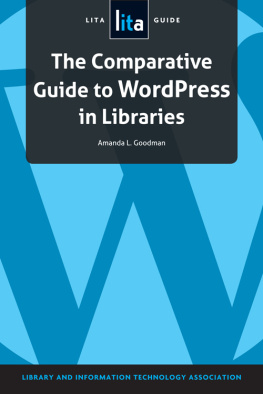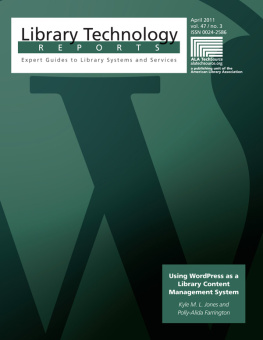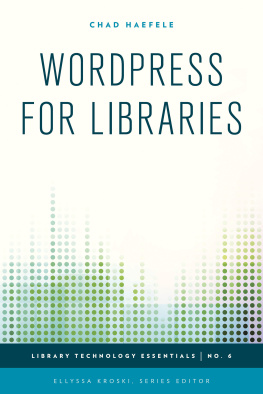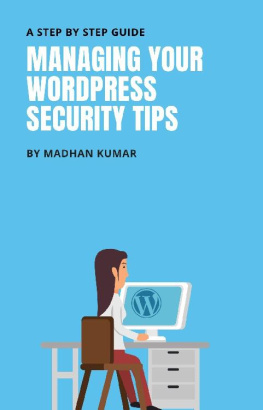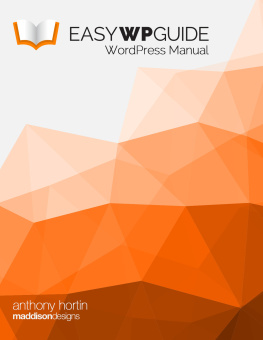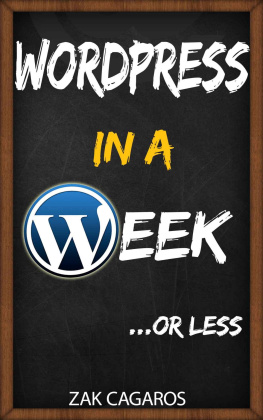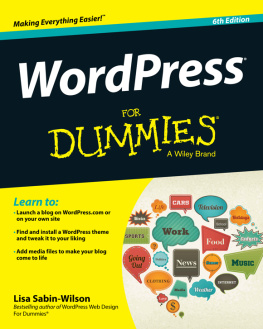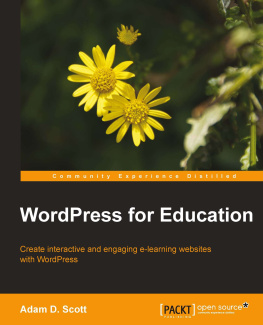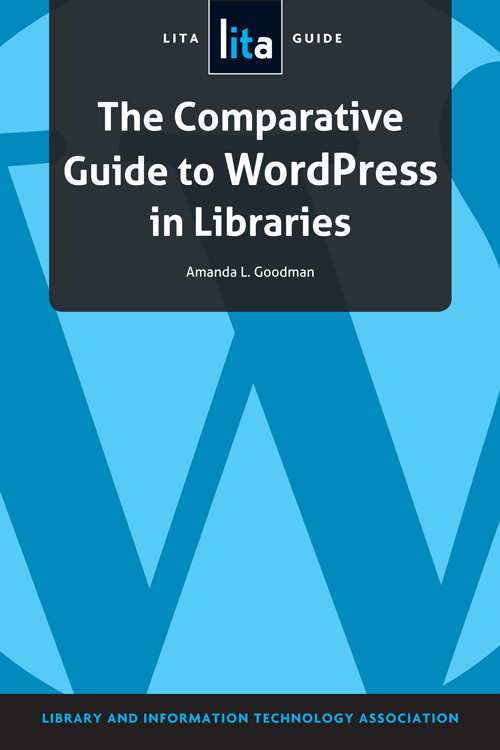
ALA TechSource purchases fund advocacy, awareness, and accreditation programs for library professionals worldwide.
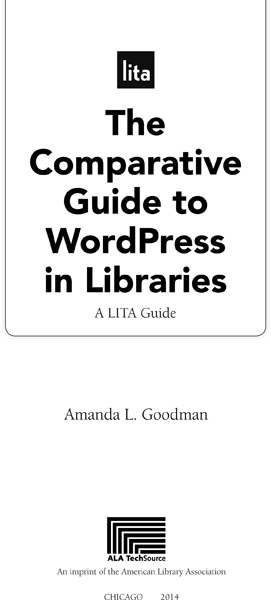
Amanda L. Goodman is the user experience librarian at Darien Library, a public library in Connecticut. She started using WordPress to manage her online presence in 2008. As an MLIS student, she redesigned the Library and Information Studies website at the University of North Carolina at Greensboro using WordPress. Her interests and work duties include web design, digitization, and teaching technology to others. She writes daily about her professional work at www.godaisies.com.
2014 by Amanda L. Goodman. All rights reserved except those which may be granted by Sections 107 and 108 of the Copyright Revision Act of 1976.
Extensive effort has gone into ensuring the reliability of the information in this book; however, the publisher makes no warranty, express or implied, with respect to the material contained herein.
ISBNs: 978-1-55570-968-6 (paper); 978-1-55570-982-2 (PDF); 978-1-55570-984-6 (ePub); 978-1-55570-983-9 (Kindle). For more information on digital formats, visit the ALA Store at alastore.ala.org and select eEditions.
Library of Congress Cataloging-in-Publication Data
Goodman, Amanda L.
The comparative guide to WordPress in libraries : a LITA guide / Amanda L. Goodman.
pages cm. (LITA guides)
Includes .
ISBN 978-1-55570-968-6 (pbk.)
1. Library Web sitesDesign. 2. WordPress (Electronic resource) 3. BlogsComputer programs. 4. Web sitesAuthoring programs. 5. Library Web sitesCase studies. I. Title.
Z674.75.W67G66 2014
006.7dc23 2013033610
The WordPress logo on the cover is used with permission from the WordPress Foundation.
Contents
Appendixes
I f youre interested in this book, youve probably made the decision that a website is the best way to implement your library project. Congratulations! You have a myriad of choices available from hosting a simple one page site through your Dropbox account to hiring an outside company or using free tools to build your own website. Fortunately, you do not have to build a website from scratchto do that, to paraphrase the great Carl Sagan, you would first need to invent the Web. Instead, you can rely on the powerful and customizable WordPress for your website development needs.
WordPress is free software that allows you to build a website with no coding experience required. However, a successful website does involve some elbow grease, as you must understand the needs of your users, figure out how to best meet their needs, and then implement a solution that gives them the information or experience they are looking for. WordPress is a tool that can help you make a website, but it needs you to make the site great.
Alongside Polly-Alida Farrington, I have cotaught hundreds of students on how to use WordPress to build library websites. While our six-week courses were focused primarily on getting librarians comfortable with the software, I want to go beyond the simple mechanics of WordPress in this book. Our students were often beginners who were directed to or had discovered a need to build a website for their library. However, the desire for a website does not mean that these students possessed the big-picture view of structuring a site that is useful for the end user. This book is therefore the next step in introducing people like my students in how to create a WordPress website that works. WordPress is built to make web development easyand with help from the libraries surveyed for this book, anyone can build a website to achieve their librarys goals and objectives.
In the first part of this book, you will learn about the WordPress software and some of the competitors. In the second part, you will get an overview of web design and how to use WordPress. The third part of this book illustrates how libraries are utilizing WordPress for their web projects. I describe these profiles as faithfully as I could from survey responses and my observations of their website. If there are any mistakes, they are my own. I attempted to contact international libraries with mixed results. While some library types are cut-and-dried (e.g., school libraries), some library projects can cross multiple dimensions. In organizing the websites, I tried to keep library websites of the same type together; however, I deemed some websites special enough to be better classified in another grouping. Additional library WordPress examples may be summarized at the end of certain chapters. These examples may not have been included in-depth due to a lack of space or because the library was unavailable to complete the survey.
Some libraries used WordPress to build their first online presence, while others used it to revamp their website, and still others for a special project. Each library revealed the details of how their website was produced, describes their patrons, and evaluates how the website has fared since launch via a survey. To conclude each librarys section, special features are shared that you can use in building your own website. These libraries serve communities that are too small to have a name or are located in the suburbs of a major city, while others support an entire state. From these libraries examples, you will be able to build a case for using WordPress for your website thanks to the variety of projects that were achieved using this software.
The versions of the software and websites described in this book are the most up-to-date versions available when this book was sent off to print. WordPress or the websites featured may have changed by the time you are reading this text. I acknowledge these limitations but aim to present a firm foundation that will be useful long after these websites are no longer updated.
This book will not give you the complex skills needed to go out and build all the twenty-one library websites from scratch. You will learn the basics of WordPress and web design. Youll also learn about WordPresss capabilities, which will help you plan for launch and future direction. If you are interested in learning more about the topics covered, an annotated list of suggested readings are included in the for further study.
Now, lets get started with WordPress!
W hen I undertook this endeavor, I was unaware of how writing a book really does take a strong community of support. My Twitter friends have been supportive as I tweeted about #bigproject.
My thanks to my mentorsDr. Nora Bird, David Gwynn, Lauren Pressley, and Beth Filar Williamswho supported me when I was a graduate student and as a librarian.
Polly-Alida Farrington gave me a priceless gift when she approached me to coteach online WordPress classes with her. I had just graduated, and she reached out at that uncertain time and set my feet on the path that I am on today. Thank you, Polly.
From the roster of those online classes, I sought and found welcome feedback and guidance in developing the survey I sent to libraries. Thank you, Susan Hansen, Stacey Hayman, Valarie Massulik, and Robin Salthouse. I wrote this book for you.
Thanks to my colleagues at Darien Library, who inspire me to work harder and do better. They are shaping who I will become as a professional.
My thanks also to Thomas, who has the saintlike endurance to hear me out every night as I chatter on about my work and my projects. And to Jessica, who has been reading my writing for ten years.
Finally, my sincerest gratitude to everyone who made this manuscript possible at ALA: Rob Christopher (marketing coordinator), Siobhan Drummond (project manager), Jenni Fry (managing editor), Patrick Hogan (senior/acquisitions editor), and Johanna Rosenbohm (copy editor).
Next page
